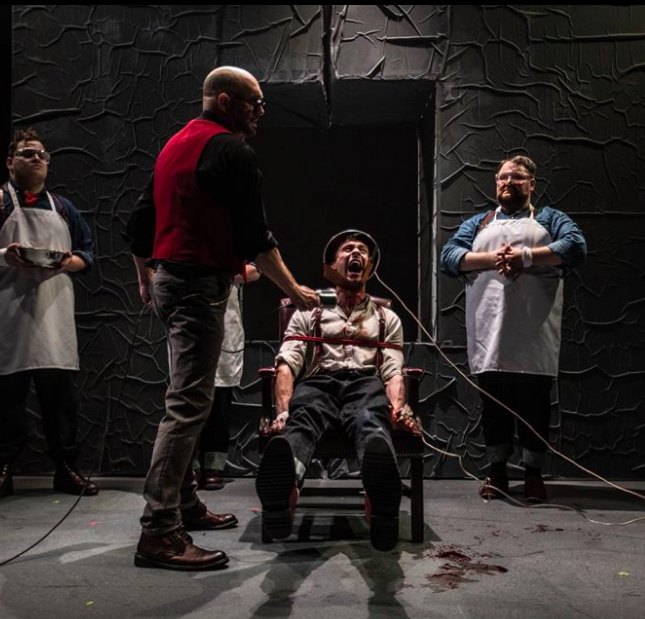
This 1984 is a shock to the senses.
What’s the purpose of noise? In propaganda it’s an effective tool. A barrage of information traumatizes us. It tests our will and patience. Noise and competing facts disrupt, confuse, and numb us until basic self care — not even preservation — becomes a mighty instrument of control. It’s slow, low-impact torture, but the cumulative result is stunningly effective. I’m leading with this because weaponized information is a fact of modern life, and the major theme explored in Robert Icke and Duncan Macmillan’s recent adaptation of George Orwell’s landmark novel, 1984. As the story veers away from Winston and Julia’s secret, desperate romance in a broken, paranoid society, and jets down a tunnel of pure horror, this interpretation evolves into an academic lecture on the art and science of manufactured reality.
I appreciate the experiment and visual inventiveness but I’m not always sure what this latest interpretation of Orwell’s cautionary tale hopes to accomplish. Projected fields of text against gray, Bauhaus inspired set pieces are as stunning, as the author’s ever- prescient words: “War is peace, ignorance is strength, freedom is slavery.” There are moments when the action on stage at Circuit Playhouse leans in the direction of dance, and all these layers create an environment that’s visually remarkable but at odds with itself. It’s difficult to`communicate how artlessness degrades humanity in an world made of overwhelming artistic gestures. As the long one act plays itself out, Carter McHann’s tremendous, anxiety-core sound design proves almost too effective. It comes on strong but its ability to punctuate and frame the action gets lost in droning persistence.
Propagandists benefit when the crowd numbs out. Theatrical goals are different, so an immersive approach to torture techniques yields mixed results.
Stripping Orwell’s story down to principal characters, with only a handful of secondary voices, robs us of any real opportunity to experience the soul crushing imbalance of individuals flickering in and out of self-awareness inside a monolithic, fear-motivated society. There are glimpses when children rat out their proud, thought criminal parents, but the bigger picture is always out of focus.
For the most part, director Courtney Oliver wrestled this seemingly minimal, but spectacle-heavy show into a matter of substance and relative clarity. Her cast seems uniquely grounded, resulting in honest, humane performances led by Danny Crowe as the show’s protagonist Winston Smith. Even when the text gives actors only a note or two to blow, they blow them fearlessly. Oliver’s prudence is also evident in a stubborn avoidance of contemporary political tropes. She carefully navigates the storm of projected information and noise and lets the adapted work speak, more or less, for itself.
Greg Boller goes sleazy as O’Brien, the inner-party member posing as a gateway to the resistance. Like a good sadist, he tells his victims exactly what he’s doing while he’s doing it. Boller’s mic drop moment is painfully literal, but he delivers a solid crash course in gas-lighting and the mechanics of the long con. So much is made of “Room 101” and O’Brien’s use of torture in 1984, but that’s all endgame — last mile delivery. “We are the dead,” indeed.
Adaptations give us a chance to explore specific narrative threads and shine new light through old windows. In this case, exposing the audience to low grade torture techniques by way of flickering or flashing light, grating inescapable sound, triggering imagery and making us all hold our pee through the intermission-free show, drowns out a more interesting theme struggling to escape a relentlessly bleak event’s sadistic gravity: Are our heroes, villains, allies and enemies all fictional constructs? Have they always been? By the time this idea expresses itself in dialogue, we’re, once again, too agitated to see the elusive bigger picture. Maybe that’s also the point.
As historic text, 1984 mocks us, predicting a “black mirror” environment of compromised privacy, nationalism and weaponized mass-information. As a piece of contemporary theater, this version of the story is neither agitprop or entertainment. It’s an experience. Whether it’s pleasant or not may prove to be a subject of contention, and probably beside the point.